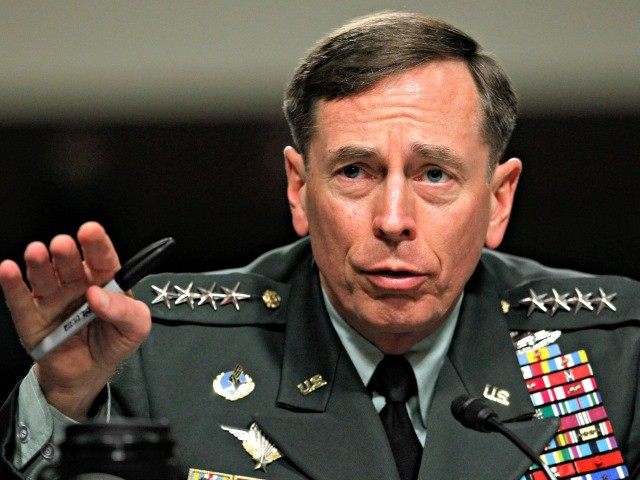Retired Army Gen. David Petraeus, who commanded U.S. troops in Iraq during the 2007-2008 surge that turned the tide of the war, said that Iranian-backed militias pose the most significant threat to Iraq and the Middle East region.
“We need to recognize that the #1 long term threat to Iraq’s equilibrium — and the broader regional balance — is not the Islamic State, which I think is on the path to being defeated in Iraq and pushed out of its Iraqi sanctuary,” Gen. Petraeus, who also served as CIA director under President Obama, said in an interview with The Washington Post. “The most significant long term threat is that posed by the Iranian-backed Shiite militias.”
“If Daesh is driven from Iraq and the consequence is that Iranian-backed militias emerge as the most powerful force in the country — eclipsing the Iraqi Security Forces, much as Hezbollah does in Lebanon — that would be a very harmful outcome for Iraqi stability and sovereignty, not to mention our own national interests in the region,” added the general.
The Islamic State (ISIS/ISIL) is also known by its Arabic acronym Daesh.
The general said that Iran is not a U.S. ally, adding that the Islamic Republic is part of the problem in the Middle East, not the solution.
“The more the Iranians are seen to be dominating the region, the more it is going to inflame Sunni radicalism and fuel the rise of groups like the Islamic State,” he explained. “While the U.S. and Iran may have convergent interests in the defeat of Daesh, our interests generally diverge. The Iranian response to the open hand offered by the U.S. has not been encouraging.”
“Iranian power in the Middle East is thus a double problem. It is foremost problematic because it is deeply hostile to us and our friends,” he continued. “But it is also dangerous because, the more it is felt, the more it sets off reactions that are also harmful to our interests — Sunni radicalism and, if we aren’t careful, the prospect of nuclear proliferation as well.”
The general did acknowledge that Iran-backed militias have prevented ISIS’s advance into Baghdad. However, he also pointed out that those same militias have committed atrocities against Sunni civilians in Iraq.
Some of the atrocities committed by Shiite militias as they move into Sunni areas include kidnappings, reprisal killings, and mass evictions of civilians from their homes, according to Petraeus.
“Longer term, Iranian-backed Shia militia could emerge as the preeminent power in the country, one that is outside the control of the government and instead answerable to Tehran,” he added.
To combat ISIS, “what is needed in Iraq at this point is all of the elements of the comprehensive, civil-military counterinsurgency campaign that achieved such significant progress during the Surge, with one huge difference — that Iraqis must perform a number of the critical tasks that we had to perform,” suggested the Gen. Petraeus.
Iraqis must provide “boots on the ground” enabled by U.S. advisers and airs assets, he said.
Maj. Gen. Qasem Soleimani, a notorious Iranian commander, is leading a force of primarily Shiite militias to retake Tikrit from ISIS in Iraq.
Soleimani once led the elite Quds Force, the special operations arm of the Iranian Revolutionary Guard Corps (IGRC). He is credited with funding and arming Shiite militias who blew up U.S. troops and shelled the U.S. embassy while Gen. Petraeus was in it.
Petraeus was asked to comment on Gen. Soleimani’s role against ISIS in Iraq.
“Yes, ‘Hajji Qasem,’ our old friend. I have several thoughts when I see the pictures of him, but most of those thoughts probably aren’t suitable for publication in a family newspaper like yours,” responded the general. “What I will say is that he is very capable and resourceful individual, a worthy adversary.”
Gen. Petraeus also expressed concern about Syria, calling it “a geopolitical Chernobyl.”
“Until it is capped, it is going to continue to spew radioactive instability and extremist ideology over the entire region,” he added.
Petraeus spoke to The Post last week during his first visit to Iraq in more than three years.
The White House confirmed Monday that the Obama administration is consulting Petraeus for advice on how to combat ISIS, despite the general’s admission that he shared classified information with his biographer and mistress.

COMMENTS
Please let us know if you're having issues with commenting.